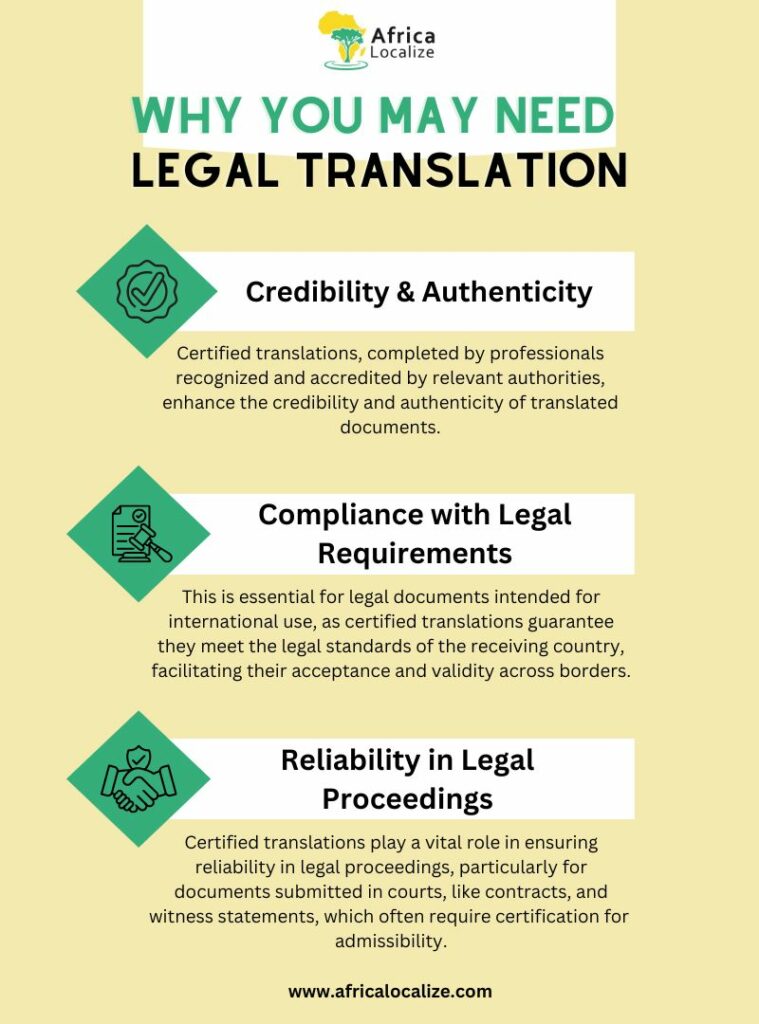Why Legal Translation is Important!

First, let’s define what is legal translation.
Legal translation is the process of conveying a legal text or document from one language to another considering the legal jargon of the source and the target languages.
It’s a highly specialized field that requires a high level of professionalism and fluency in both source and target languages.
Due to the sensitive nature of legal materials, legal translators must also acquire a deep understanding of legal terminology, systems, and cultural nuances to deliver accurate, reliable translations of important documents.
Who Needs Legal Translations?
Many bodies and individuals may need to translate legal documents at some point.
Here are a few of them.
Large Corporations:
Multinational corporations that operate in various countries with different legal systems. They need professional legal translation to ensure compliance with local laws and regulations.
Contracts are drafted and signed daily in corporations, internally with employees or externally for business deals, making legal translation essential for maintaining the legal rights and terms of all parties.
Legal translation is also vital for communication within corporations or with external parties.
In multinational corporations, legal translation of employee manuals, policies, and legal notices ensures all employees are aware of company policies and legal requirements, guaranteeing smooth communication.
Additionally, multinational companies have clients or suppliers worldwide, requiring clear and accurate legal translation to facilitate all types of client-corporate communications.
Individuals:
Accurate legal translation is crucial for various personal legal matters, including immigration documents, personal certificates, and wills, ensuring compliance and proper legal processing.
It facilitates access to justice by enabling individuals involved in foreign legal proceedings to understand and participate effectively.
For property and estate matters, translating real estate documents and inheritance paperwork ensures adherence to local laws and the proper execution of wishes.
In education and employment, translating academic credentials and employment contracts is essential for individuals pursuing academic and professional opportunities abroad.
There Are Five Characteristics Of Legal Translation.

A reliable legal translation should mainly have these characteristics:
- Accuracy: Legal documents must be translated with utmost precision to avoid ambiguity or misinterpretation that could lead to legal issues or disputes. Every word, phrase, and sentence must accurately reflect the original text’s meaning and legal implications.
- Application of Legal Terminology: Legal language is often complex and specific, making it challenging to find equivalents of all terms in the target language. A translator must conduct diligent research to understand each term’s definition and precisely reflect it in the target text.
- Attention to Details: Legal Translation is related to critical aspects of life; therefore, paying attention to every detail and performing careful proofreading and editing to ensure a legal document is free of errors or misunderstandings that could lead to any legal dispute is imperative.
- Cultural Adaptation: While preserving the original meaning, legal translators must adjust the text to align with the cultural and legal context of the target language. This goes beyond linguistic proficiency to understanding the cultural context and norms that influence legal cases.
- Formal Qualifications and Certification: Many translators and service providers hold formal qualifications in both law and translation.
Legal translators often gain professional legal experience during their career or some related education that equips them with suitable knowledge to handle complex legal documents and texts.
Three Reasons Why You May Need Legal Translation
Legal translation needs to be certified for several important reasons, including ensuring accuracy, reliability, and adherence to legal standards.

These reasons may be summarized as follows:
Certified translations, completed by professionals recognized and accredited by relevant authorities, enhance the credibility and authenticity of translated documents.
This recognition is crucial as many legal bodies, government agencies, and institutions exclusively accept documents certified by recognized professionals, ensuring the accuracy and fidelity of the translation to the original document.
Certification ensures compliance with legal requirements by adhering to regulatory standards set by different jurisdictions for the translation of legal documents and determining who is qualified to perform such translations.
This is essential for legal documents intended for international use, as certified translations guarantee they meet the legal standards of the receiving country, facilitating their acceptance and validity across borders.
Certified translations play a vital role in ensuring reliability in legal proceedings, particularly for documents submitted in courts, like contracts, affidavits, and witness statements, which often require certification for admissibility.
Courts trust certified translations for their accuracy and reliability, ensuring a fair resolution of legal disputes by guaranteeing that all parties have an accurate understanding of the translated documents involved.
Translation certification protects against fraud through a detailed verification process that assesses the translator’s qualifications and the quality of the translation, safeguarding against fraudulent or misleading translations. Additionally, certified translators are held to high professional standards and accountability for their work, offering an additional layer of security and trust, and ensuring the integrity of the translated documents.
What are the types of Legal documents to translate?
Several types of Legal documents need to be translated to protect your best interests and ensure achieving your desired outcome. Some examples of these documents are:
- Contracts
- Certificates and Licenses
- Patents
- Real Estate Documents
- Immigration Documents
- Wills
- Insurance Documents
- Financial Documents
Other legal services:

In addition to document translation, other services fall under the category of legal translation and that also help corporations or individuals to achieve their legal goals, such as:
Interpretation Services: Legal interpretation involves providing verbal translation in real-time during legal proceedings, meetings, conferences, or negotiations.
Legal Transcription: Legal transcription involves converting spoken legal content, such as court hearings, depositions, or recorded interviews, into written text.
Legal Review and Editing: Legal review and editing services involve thorough proofreading and quality assurance.
Conclusion:
Legal translation is an essential and specialized field critical in ensuring accurate communication and compliance with legal standards across different languages and jurisdictions. It requires not only fluency in source and target languages but also a deep understanding of legal terminology, cultural nuances, and the intricacies of legal systems.
Whether it is for multinational corporations seeking compliance, individuals navigating personal legal matters, or the smooth functioning of legal proceedings, the characteristics and benefits of certified legal translation are undeniable.
By providing accurate, credible, compliant, and reliable, certified translations in Africa Localize, upholds the integrity of legal documents and facilitates effective communication and understanding in legal contexts.
